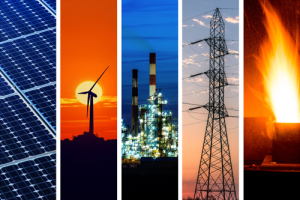4 Popular Energy Policy and Climate Careers
Published April 29, 2025
 Not everyone can brag that they earn a living by saving the environment. But that’s exactly what professionals in energy policy and climate do. They combine expert scientific knowledge with a passion for policy and progress.
Not everyone can brag that they earn a living by saving the environment. But that’s exactly what professionals in energy policy and climate do. They combine expert scientific knowledge with a passion for policy and progress.
Whether you’re a policy architect looking to move into an environmentally focused career or a climate scientist ready to make a real impact, consider how a Master of Science in Energy Policy and Climate degree can give you the boost you need.
What is Energy Policy and Climate?
Energy Policy and Climate focuses on addressing the impacts of climate change through energy systems and policies. This multi-disciplined field uses environmental science, economics, policy analysis, and engineering to create sustainable energy solutions that address climate change.
Demand for Professionals in Energy and Climate
A surge in demand for energy means an increase in the demand for professionals, including political scientists, who are well-versed in these fields. Our growing reliance on sustainable energy sources also increases the need for experts who are equipped to influence decisions that balance energy efficiency and environmental impact.
Key Skills and Competencies Required
Energy policy and climate professionals must develop excellent skills and knowledge in:
- Policy Analysis: Expertly evaluating policies and recommending changes for environmental compliance.
- Environmental Science Knowledge: Utilizing a deep understanding of the science behind climate change and energy to craft impactful new policies.
- Engineering Fundamentals: Gaining familiarity with existing energy systems and infrastructure for improving environmental technology solutions.
- Analytical and Research Skills: Providing expert analysis of data to foster informed policymaking.
- Communication and Advocacy: Breaking down complex topics to effectively communicate policies, advocate for sustainable practices, and turn topics into actionable ideas.
Popular Careers in Energy Policy and Climate
Energy policy and climate professionals don’t just write policy. A Master’s degree in Energy Policy and Climate can lead to advancement in many different careers or even a lateral career move for existing professionals.
Chief Sustainability Officer
Salary: $174,293, mid-level; $449,076, senior-level
Job Growth: -0.09%
Coordinate with management, shareholders, customers, and employees to address sustainability issues and oversee a corporate sustainability strategy.
Biomass Power Plant Manager
Salary: $115,620, mid-level; $191,892, senior-level
Job Growth: 0.30%
Oversee operations at biomass power generation facilities and manage the activities at the plant, including the supervision of the operations and maintenance staff.
Hydroelectric Production Manager
Salary: $115,620, mid-level; $191,892, senior-level
Job Growth: 0.30%
Manage operations at hydroelectric power plants and ensure equipment is maintained and monitored for efficiency and safety.
Wind Energy Development Manager
Salary: $96,589, mid-level; $219,511, senior level
Job Growth: 0.73%
Manage the development and evaluation of wind energy business opportunities, including environmental studies, permits, and proposals, as well as potentially overseeing project construction.
Data Source: Industry, occupation, compensation, and projected growth data are supplied by Lightcast. Economic and workforce information adjusts based on the selected geographic region and may include estimates made by Lightcast when actual data is not available. Johns Hopkins University cannot guarantee employment placement, salary level, or career advancement.
How to Get Started in Energy Policy and Climate Fields
In addition to earning a master’s degree, what are some steps you can take to enter this dynamic field?
Networking and Professional Associations
Networking is a valuable step for any profession. Consider joining professional associations, such as the National Association of Environmental Professionals (NAEP) or the American Council for an Energy-Efficient Economy (ACEEE). These organizations allow you to connect with industry leaders, attend conferences, and access resources like job boards while you earn your degree.
Internships and Projects
There’s no substitute for hands-on experience in this field. Internships with government agencies, think tanks, or energy firms give you a valuable practical understanding of the policies, environmental regulations, and anticipated market challenges.
Participating in research projects or working with nonprofits on sustainability initiatives can strengthen your resume and build relevant skills.
Succeed in A Career in Energy Policy and Climate with a Degree from JHU AAP
Johns Hopkins University’s Advanced Academic Programs division offers working professionals the opportunity to earn master’s degrees around their busy schedules. The courses are all online, giving you the freedom to earn your MS in Energy Policy and Climate degree on your own terms.
Request information about JHU AAP’s programs for working professionals and apply today!